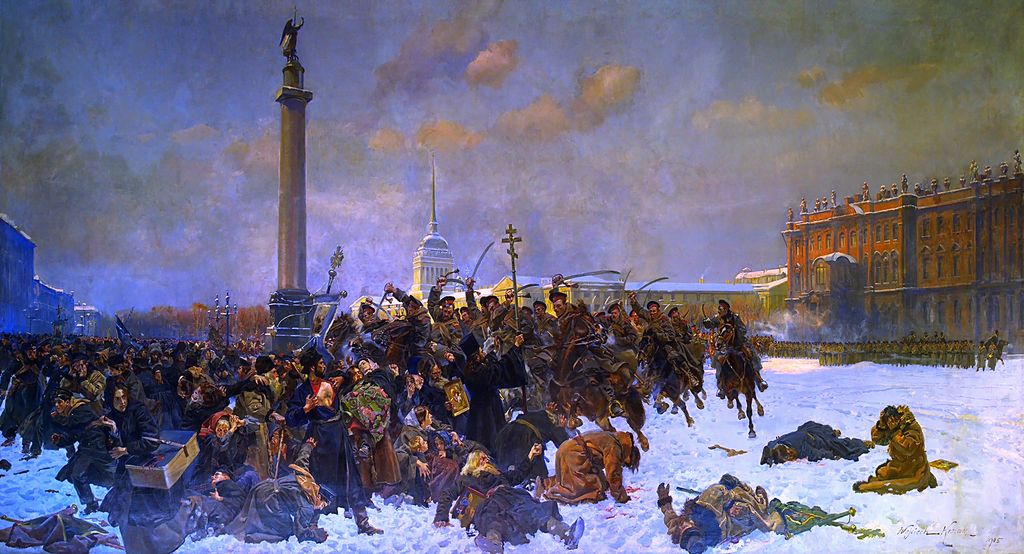During 1917, the Russian Empire encountered a series of revolutions called the Russian Revolution. The events helped create the Soviet Union after destroying the Tsarist autocracy.
The first major revolution was in February 1917. Tsar Nicholas Romanov, the emperor, was forced to step down. He was replaced with a provisional government. The second major revolution was in October. Communist Bolsheviks replaced the provisional government and created the Soviet Union. The royal family was shot and killed.
- Background
- February Revolution
- February to October
- The October Revolution
- The Aftermath
Background
Russia was an autocratic state. There was no space for democracy. During the 1890s, advancement in Russian industry created more jobs in cities. As people moved there, cities grew. But the living conditions were horrible with poor sanitation.
In 1896, after the death of Tsar Alexander III his heir, Nicholas II became the emperor. Tsar Nicholas II’s coronation ceremony started with a dreadful event. The government arranged for free things to be given to the peasants. But more people came than expected by the officials, and the arrangement was not up to the mark. It resulted in a stampede and many people died.
On the night of the tragedy, there was a party at the French embassy, though Nicholas II did not want to attend but was persuaded to go. Later on, it was held against him. Many called him deeply insensitive.
Back in the cities, workers began to create political parties to try and change the horrible conditions that they worked and lived in. In the early 1900s, Russia experienced a wide range of protests and strikes.
In 1905, Russia lost a war with Japan. Soldiers and sailors were embittered, who felt their lives had been just thrown away in a hopeless war against the Japanese. It did not help Tsar Nicholas in his bid to be popular. There was general disarray among the people. Further, the factories were not paying, and there were shortages.
Russia losing the war against Japan changed the view regarding autocracy. It added to the people’s anger that resulted in peaceful protests from workers. But, these workers were shot at by the Emperor’s guards. Thus a spontaneous protest ended in a bloodbath. The events of Bloody Sunday, as it came to be known, damaged Tsar Nicholas’s reputation forever.
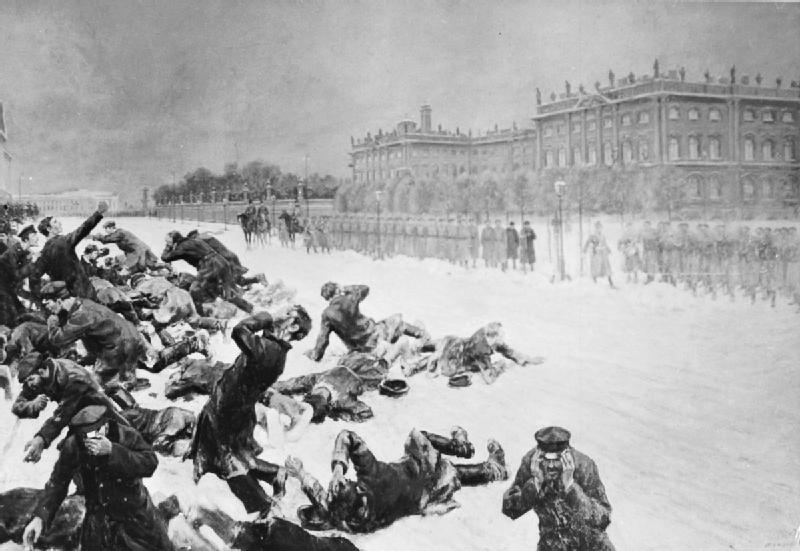
Following this event, a rebellion began. Though it did not bring about any change but made the emperor Nicholas promised to create an elected parliament or Duma.
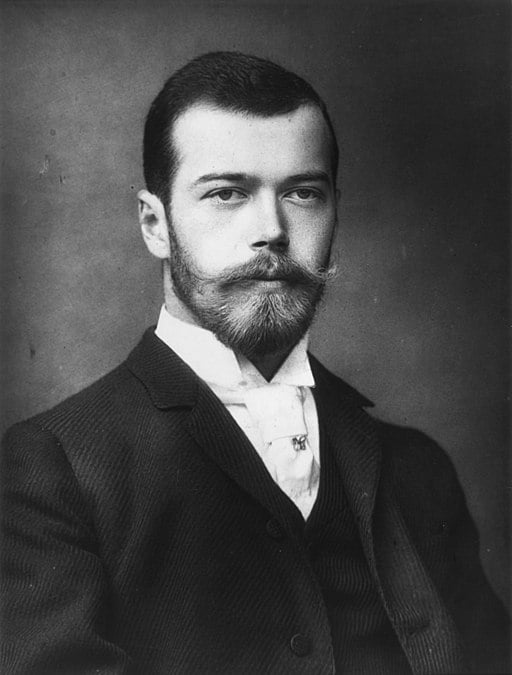
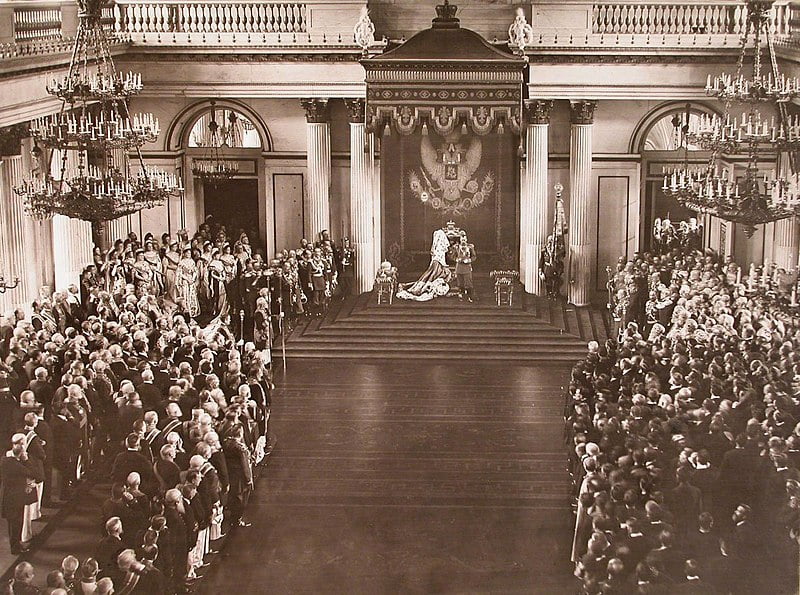
In March 1906, for the first time, the Duma was elected. It consisted of both left-wing and right-wing members, including socialists and those who were very loyal to the emperor. There were also arguments to take power away from the Emperor and give it to ordinary people. The emperor, Nicholas, even stopped the workings of Duma that made people angrier than they already were.
In 1914, World War I started. Russia joined World War I against Germany (for the article on WWI – click here). At first, people came together and the country was united by patriotism. But soon problems arose due to lack of supplies. By 1915, many soldiers were being sent to fight without guns. Moreover, the lack of communication resulted in poor plans being made by the army officers that made soldiers unhappy. Many Russians died in due course of time.
In 1915, the Emperor put himself in charge of the military strategy. He moved to the army headquarters. This was a mistake. Not only he did not improve the situation, he began to be blamed for it.
Due to the situation, he was not able to attend government affairs, and his wife Queen Alexandra was left in charge. Whenever the Duma tried to warn the emperor that the people were getting angry, she would say they were lying, so he would ignore them. The emperor even ignored a report by his secret police, the Okhrana, which warned him of the impending revolution that might happen if things did not get better for ordinary people.
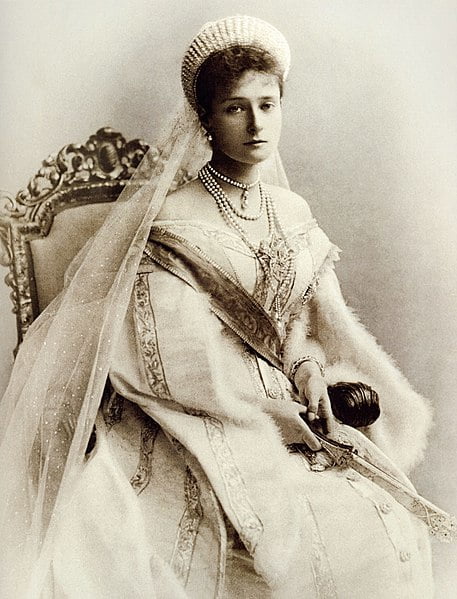
February Revolution
In early February 1917, a series of strikes began the first revolution. In St. Petersburg, the capital of Russia, people in the food queue began a demonstration. Thousands of women who worked in fabric factories left to join them. By February 25th, the strike spread through the capital, and, most of St. Petersburg factories had to close.
On the evening of the 25th, Nicholas II sent a telegram to the then chief of the army in St. Petersburg, to tell him to use his soldiers to stop the strikes. The army chief did exactly that, but the soldiers joined the demonstrations along with workers instead of stopping them. The police joined too, and finally, the government collapsed.
The demands were to end
– World War I,
– shortages in food supplies, and
– autocracy.
On March 13th, 1917, Nicholas gave up his throne and subsequently the control of Russia. A provisional (temporary) government was formed in its place.
February to October
After the February Revolution, Alexander Kerensky, the provisional government’s leader, tried to improve things by allowing freedom of speech and even letting political prisoners go free. Despite this, there was growing discontent. The wages went down, the national debt grew, and on top of it, food was scarce.
In April 1917 Vladimir Lenin, a communist, arrived in St. Petersburg. He had been exiled to Switzerland by the emperor, but the provisional government allowed him to come back. He began to lead a communist group called Bolsheviks.
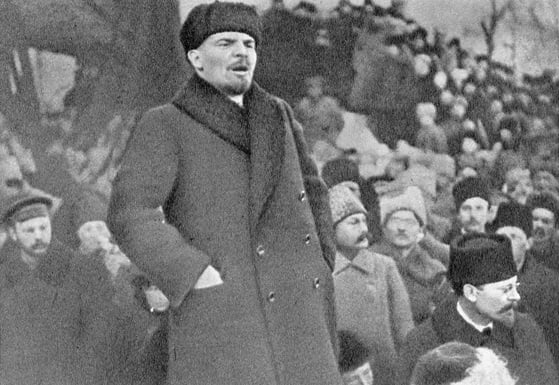
In July, Lenin was even accused of being “German agent” by Alexander Kerensky’s government that forced him to escape. But Lenin continued demanding peace, land, and bread without any delay. Therefore, he got support from peasants, soldiers, and workers who wanted immediate change.
The October Revolution ( Bolshevik Revolution )
The government was in paralysis. Lenin was very good at using this opportunity. On October 10th, the Bolshevik’s central committee voted to start a revolution. On October 23rd, a revolution began in Estonia and another one started two days later in St. Petersburg. This time the revolution was mostly peaceful. The Bolsheviks’ Red army took over many government buildings, though without a fight.
On 25th October, a new government was formed by the Soviets, called Congress. During its first few meetings, some members who were not Bolsheviks walked out, but this made little difference to its decisions.
On the morning of the 26th, they took over the emperor’s old Winter Palace. With this, the revolution ended. All those parties that opposed the Bolsheviks eventually broke up, and their leaders got arrested.
Congress then started to get rid of private property. This meant all land and money were to be owned by the people, and control of factories was given to their workers.
In December 1917, an organization, Cheka, was established that answered only to Lenin. It aimed to combat any counter-revolution. Later on, this organization got evolved to form KGB, the Soviet’s most infamous security agency.
The Aftermath
The non communist countries challenged the revolution. In July 1918, countries such as America, the United Kingdom, and France sent armies to fight the Bolsheviks.
Lenin began a scheme to win the war. He began diverting food and supplies to the communist army. The plan worked and the Bolsheviks won the war, but lack of food meant that many people died of hunger.
The Third Russian Revolution was an anarchist revolution against the Bolsheviks that lasted from 1918 to 1922. During this time, a civil war broke out between the Red Army Bolsheviks and the anti-Bolsheviks (also called the White Army). The Bolsheviks won and the new country was called the United Soviet Socialist Republic or USSR.
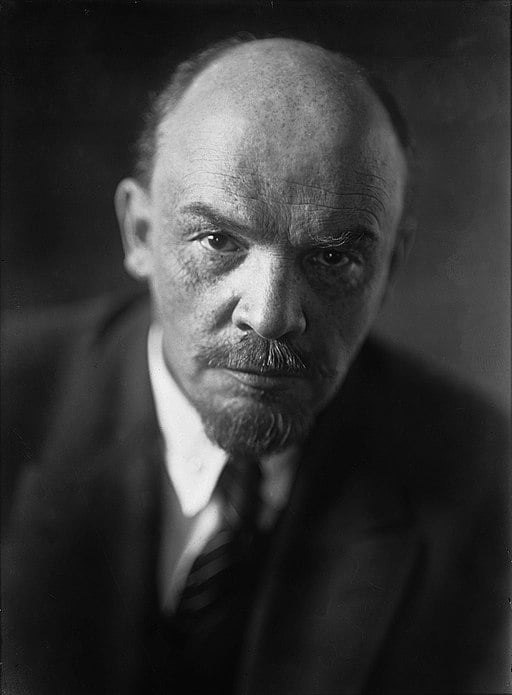
In January 1917, the person who was in exile was Vladimir Lenin, and the person who ruled Russia was Tsar Nicholas II. By October of the same year, there was role reversal as Tsar was held prisoner and Lenin had all the power.
Without Lenin, there would not have been a Bolshevik Revolution. Lenin was quickly becoming the most powerful man in Russia and formed the communist state. His secret police were commencing a strategy of violent repression that would become known as the Red Terror.
In the early 1920s, some European countries recognized the Soviet Union as a country, while America refused to do so until 1933.
The main leaders of the Bolsheviks were Vladimir Lenin, Joseph Stalin, and Leon Trotsky. Lenin died in 1924. After his death, Stalin consolidated his power and even forced Trotsky out. The man who would become the most powerful dictator in history was now cementing his position.
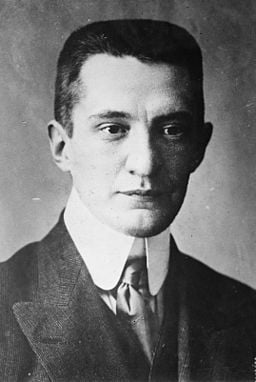
How could the mighty Romanov dynasty, the tsars that had control over everything, that lasted for 300 years, fall?
At the heart of the Russian Revolution lay a very personal battle between Lenin’s Ulyanov family and the royal family who were determined to retain autocratic rule.
In the middle of the 19th century, there were two inventions, the revolver, and the high explosive dynamites, both of which were widespread in Russia which enabled amateur people to get together and organize an assassination.
There were many assassination attempts on the life of the tsar, Alexander II, emperor of Russia. Finally, one fateful day it happened.
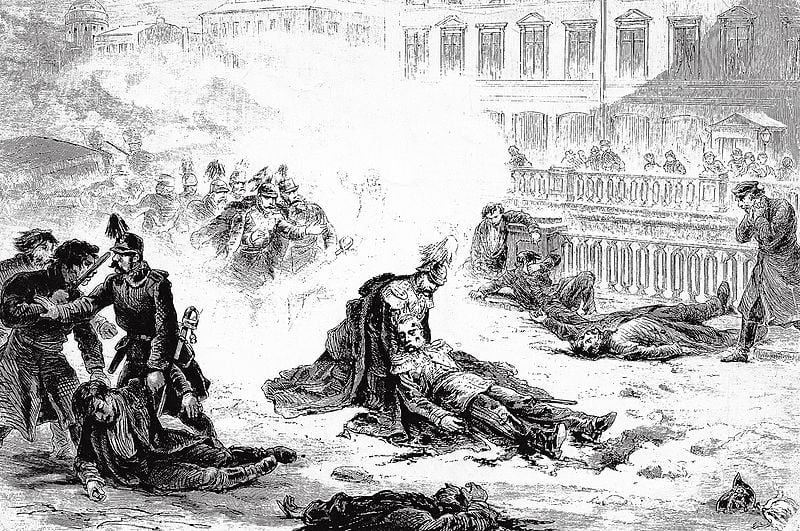
The conspirators were hanged for their crimes, but the movement against the royal family continued and it soon attracted the attention of one Aleksandr Ulyanov, eldest son of the Ulyanov family and elder brother to Lenin.
There was no great revolution following the death of Tsar Alexander II. He was succeeded by his son, Alexander III, who, upon viewing his dying father, vows to never let the same fate befall him.
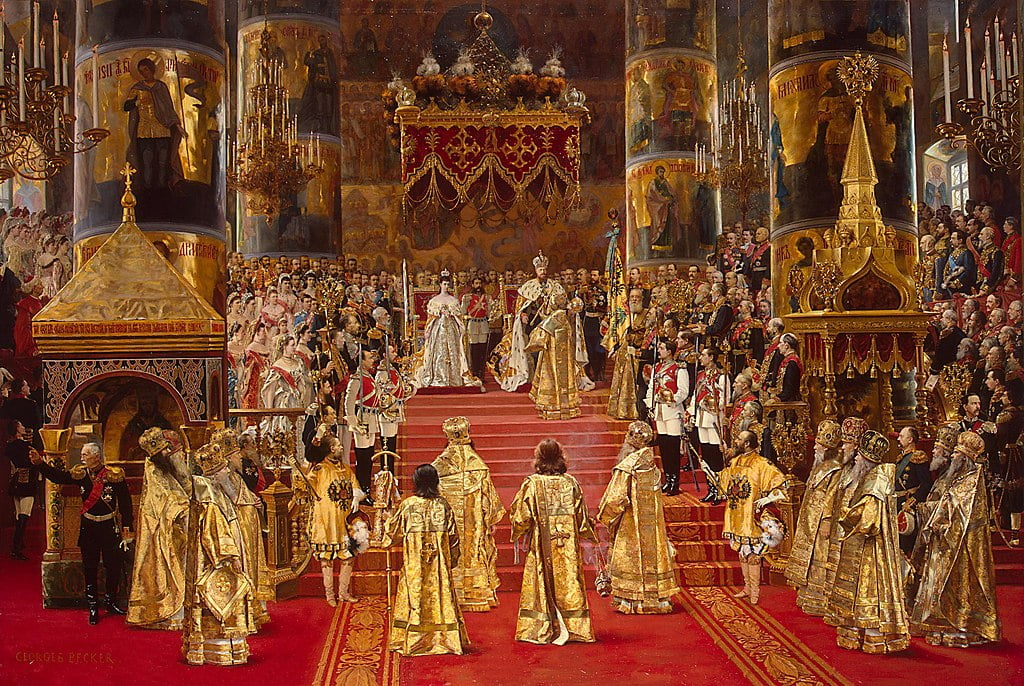
Despite the enormous unrest, Russian autocratic rule continued. So, Alexander III decided to come down hard on Russia, as he was a forceful character.
Russia was modernizing at a fast rate, but the political system remained deeply autocratic. Because of the conditions in Russia at the time, middle-class families were not allowed political opinions. During this time, one such person who got caught up in the radical world was Aleksandr Ulyanov also known as Sasha, Lenin’s elder brother. He was like Lenin himself, was brilliant intellectually. He joined a student group that decided to make a bomb to kill Alexander III.
But the plan was undone by Okhrana, the secret police of the Russian empire, that got the wind of the attempt on the tsar’s life. The terrorists got arrested and sentenced to death. Alexander III very generously said, “Those that repent, I will reprieve. Those that don’t, I will hang,”. According to Sasha, it was going against his principles to ask for a reprieve. The hanging of Sasha is often seen as what motivated Lenin.
Lenin entered the underground revolutionary movements, following the path of his brother. Just like Sasha, Lenin was tracked by the Okhrana.
In 1894, Tsar Alexander III suddenly fell ill when he was just 49. He died unexpectedly. Soon after his father’s death, Nicholas married a german princess who became Tsarina Alexandra.
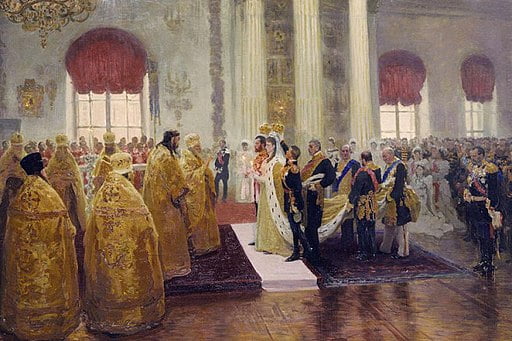
Tsar Alexander III left behind his son Nicholas rather unprepared to inherit his throne. He was not ready to take on so much responsibility. It is said that Nicholas II had little training to rule the vast Russian empire.
As an emperor, Nicholas II showed he had no intention of sharing power democratically. Thus, ruling any possibility of reform. He laid the foundations of his demise.
Coming back to Russian Revolution – On July 17th, 1918, the Romanovs were awakened at midnight and taken into the basement room where they were shot.
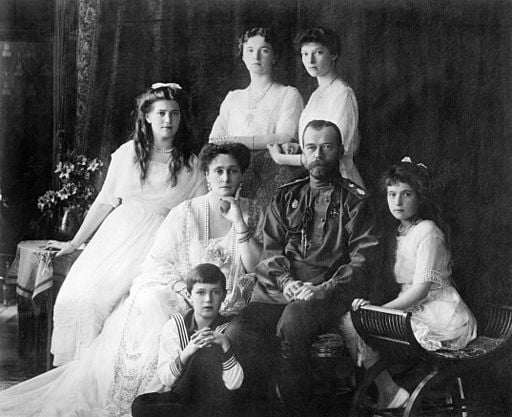
This once all-powered dynasty had authorized the execution of Sasha Ulyanov, Lenin’s elder brother. But now the tables had turned, and the Romanovs were no more. No paper trail said Lenin gave the orders to kill the royal family. But one wonders.
